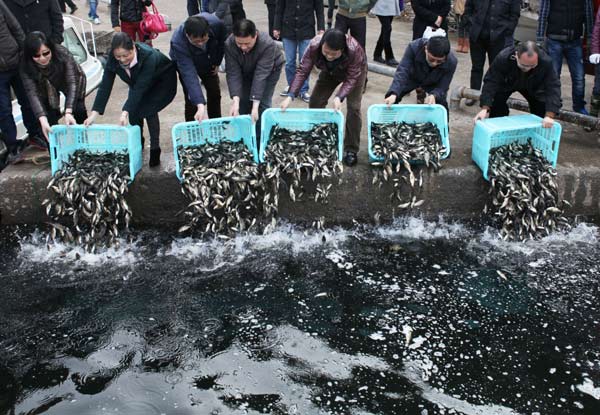 |
|
Workers at the Shanxi Reservoir in Wenzhou put fry into the reservoir in December 2012. PROVIDED TO CHINA DAILY |
|
Hope flows into rural areas Wang Qian in Tianshui, Gansu In the first 50 years of his life, Xiao Kecheng carried water in iron buckets for more than five hours every day from the foot of the mountains to his home in one of China's poorest villages in Gansu province. Things got easier in 2010, when tap water was supplied to Gaoshan village in Tianshui. "The water brings hope to the village," the 59-year-old villager said, adding that the local water project helped boost farming and livestock breeding. Gansu authorities promised to provide safe drinking water to all its rural residents, totaling about 21 million people, before the end of 2015. The move was instrumental to the country's ambitious plan for the rural population to have safe drinking water by 2015. In 2005, China launched a rural safe drinking water program to provide 410 million rural residents and 32 million rural teachers and students with access to safe drinking water. There are still more than 100 million rural people without access to safe drinking water, according to the 2014 government work report. "The central government is taking great efforts to provide rural areas with safe drinking water, with about 24 billion yuan ($ 3.9 billion) invested in 2014," said Yan Guangyu, deputy director of the rural water resources with the Ministry of Water and Resources. Local authorities allocated about 12 billion yuan this year in rural water projects, he said. Besides guaranteeing safe drinking water in rural areas, improving rural water quality will be emphasized in the 13th Five-Year Plan (2016-2020), Yan said. According to the Ministry of Water Resources, the construction of 277 county-level water quality monitoring centers will be built this year. "At least 20 physical and chemical properties will be tested daily in these centers supplying rural water, which can help avoid diseases caused by natural and untreated water," said Zao Mingming, director of the water quality monitoring center of Zhangjiachuan Hui autonomous county. |
"As the major source of water for the city, improving the water quality is crucial as it is directly linked to citizens' health," Wang said, adding that the top priority is to provide residents with the cleanest water.
Wenzhou water authorities plan to invest more than 1.6 billion yuan before 2017 to clean up the Shanxi reservoir.
As of June, up to 695 million yuan have been used to protect the reservoir and build nearby wastewater and garbage treatment factories, according to the Wenzhou water resources bureau.
The water quality in the reservoir has also improved from the fifth grade to the second grade - certified for extensive drinking water supplies this year.
As one of the earliest coastal cities to open up in China, Wenzhou is again taking the lead in fighting water pollution.
Other cities like Beijing and Shanghai are joining in the battle against water pollution, following decades of industrial growth.
"Guaranteeing safe drinking water to the urban and rural population has been on top of the agenda of water authorities at all levels," said Zhang Hongxing, an official with the Ministry of Water Resources.
The quality of 90 percent of the nation's reservoirs for drinking water meets the national standard, according to the ministry.
Since 2006, the Ministry of Water Resources released 175 key source water sites, which are under annual examination and assessment. The Shanxi reservoir is on the list.
The country's leadership has repeatedly promised all-out efforts to conserve resources and curb pollution. When President Xi Jinping was governor of Zhejiang from 2002 to 2007, he emphasized important water programs that covered the provision of safe drinking water, effective water conservancy and wastewater treatment.
Feng Qiang, deputy director of the Zhejiang water resources bureau, said that the Zhejiang authorities have vowed to tap technology to provide safe drinking water for its population within seven years.
Premier Li Keqiang has said that China will "declare war" on pollution. The resolve sets out a clear path for improving the environment, with the measures legally enforced, said Meng Wei, head of the Chinese Research Academy of Environmental Sciences.
